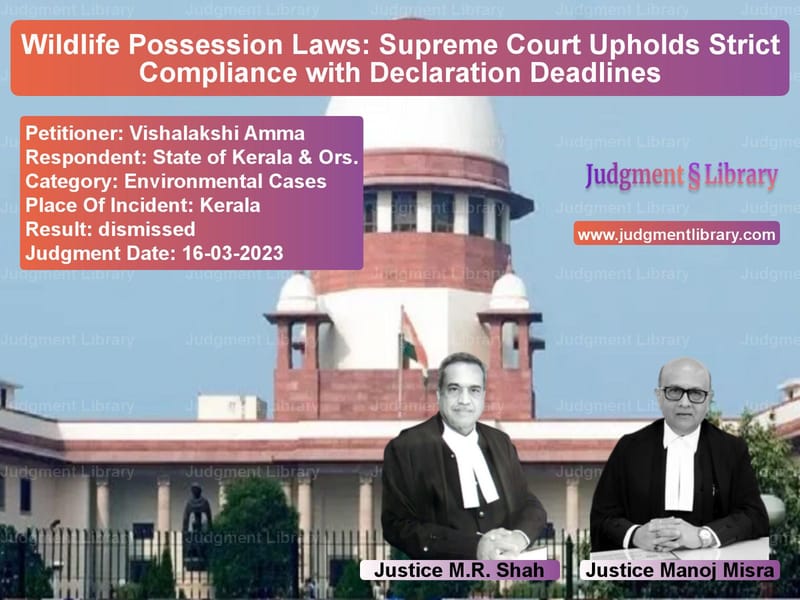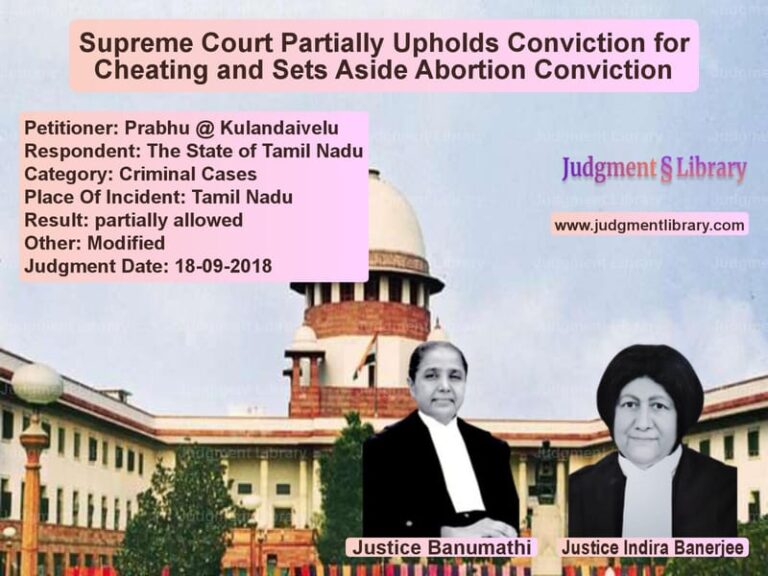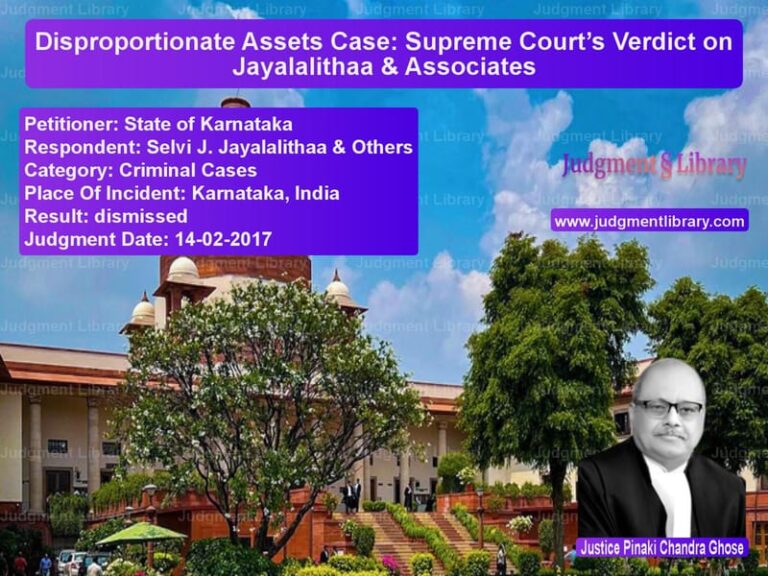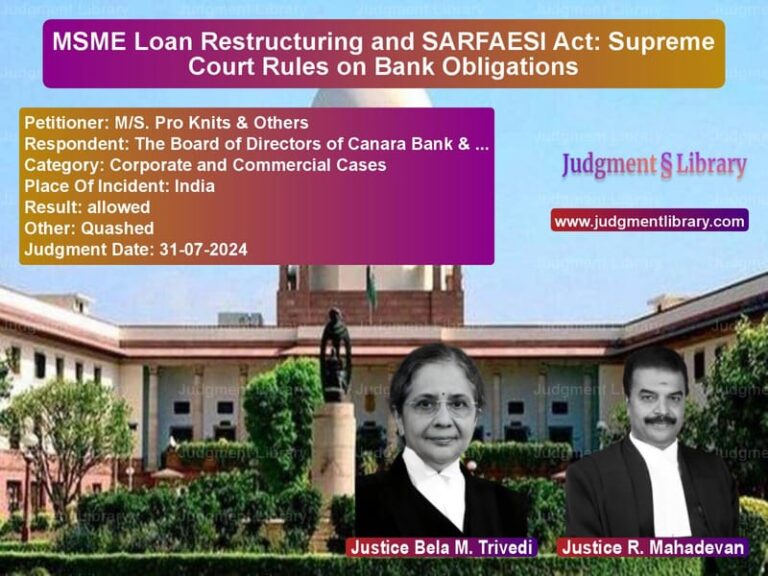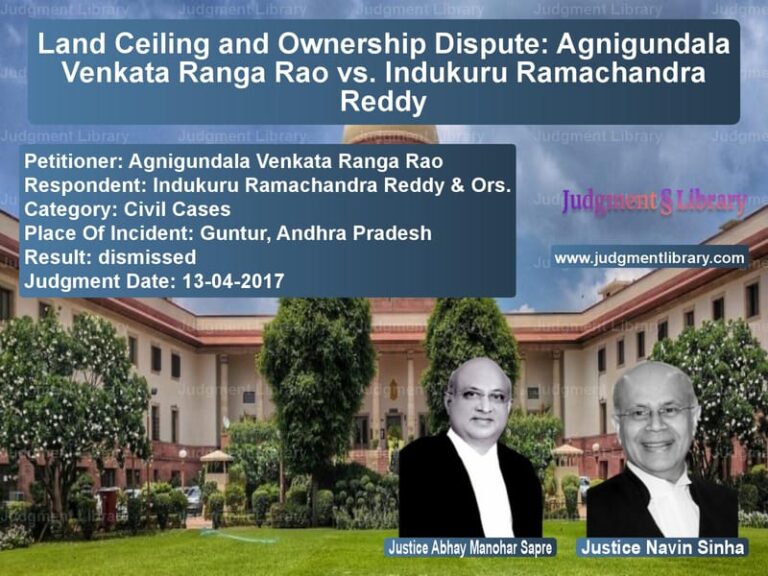Wildlife Possession Laws: Supreme Court Upholds Strict Compliance with Declaration Deadlines
The case of Vishalakshi Amma v. State of Kerala & Ors. highlights the importance of adhering to statutory deadlines under the Wild Life (Protection) Act, 1972. The dispute revolved around whether a person could claim ownership of wildlife articles, such as deer horns, despite failing to meet the deadline for declaration as prescribed under the Declaration of Wild Life Stock Rules, 2003. The Supreme Court was tasked with determining whether the delay in filing a declaration could be excused.
The High Court of Kerala had ruled against the petitioner, holding that the prescribed deadline under Rule 4(2) of the Wild Life Stock Rules, 2003 was mandatory. The Supreme Court was called upon to examine whether this decision should be overturned or upheld.
Background of the Case
The case stemmed from an incident where the petitioner, Vishalakshi Amma, was found in possession of deer horns in her home. Under the Wild Life (Protection) Act, 1972, individuals in possession of wildlife articles must declare them within a specific timeframe.
Key facts of the case:
- The Declaration of Wild Life Stock Rules, 2003 required all individuals possessing wildlife articles to submit a declaration within 180 days from the publication of the rules, i.e., by October 18, 2003.
- The petitioner did not file a declaration until May 25, 2011, almost 8 years after the deadline had expired.
- The authorities rejected her declaration on the grounds that it was filed beyond the prescribed period.
- The petitioner challenged this rejection in the Kerala High Court.
- The High Court ruled in favor of the government, stating that the deadline was mandatory.
Arguments by the Parties
Arguments by the Appellant (Vishalakshi Amma)
The appellant, represented by legal counsel, argued:
- The time period under Rule 4(2) should be considered directory rather than mandatory.
- The petitioner discovered the deer horn in an old house and was unaware of the requirement to declare it earlier.
- The authorities should have considered her declaration despite the delay, especially since the rules allowed some flexibility.
- The refusal to grant ownership based on a mere procedural lapse was unfair and disproportionate.
- The Madras High Court, in the case of C.D. Gopinath v. State of Tamil Nadu, had taken a lenient approach and allowed late declarations.
Arguments by the Respondents (State of Kerala)
The government’s legal team countered:
- The law was clear that individuals had 180 days to declare possession of wildlife articles.
- The rules were meant to prevent illegal trade and possession of wildlife products, and allowing late declarations would defeat the purpose.
- The petitioner’s failure to declare within the stipulated time meant that her claim was invalid.
- The Madras High Court’s ruling was not binding on other courts.
- Strict enforcement of the deadline ensured compliance with wildlife conservation policies.
Supreme Court’s Legal Analysis
Mandatory Nature of the Deadline
The Supreme Court examined the provisions of the Wild Life (Protection) Act, 1972 and the Declaration of Wild Life Stock Rules, 2003. The Court emphasized that the 180-day deadline was enacted to regulate and track the possession of wildlife articles to prevent illegal trade.
The Court observed:
“Looking to the object and purpose of Sections 40 and 40A and the object and purpose for which Rules, 2003 has been enacted, the period of 180 days prescribed under Rule 4(2) has to be construed and considered as mandatory, otherwise the object and purpose of the Act, 1972 and the Rules, 2003 shall be frustrated.”
Publicity and Awareness of the Rules
The Court rejected the petitioner’s claim that she was unaware of the requirement to file a declaration. It noted that Rule 3 of the 2003 Rules placed an obligation on the government to publicize the requirement widely through electronic and print media. This ensured that individuals had sufficient knowledge of their obligations.
Impact on Wildlife Conservation
The Court emphasized the importance of wildlife conservation and the risks associated with allowing exceptions to the rule. It held that any relaxation in the deadline could open the door for misuse, particularly by those engaged in the illegal wildlife trade.
Final Judgment by the Supreme Court
The Supreme Court ruled:
- The deadline under Rule 4(2) was mandatory and could not be relaxed.
- The petitioner’s failure to declare the deer horns within 180 days meant that ownership could not be granted.
- The judgment of the Kerala High Court was upheld.
- The appeal was dismissed.
Implications of the Judgment
The ruling has far-reaching implications for individuals who possess wildlife articles and fail to declare them on time. It establishes that:
- The deadline for declaring wildlife possessions is strict and non-negotiable.
- Possession of wildlife articles without a declaration leads to forfeiture of ownership rights.
- The law prioritizes conservation efforts over individual claims of ignorance or delay.
- Courts will not entertain late declarations, even if they appear to be genuine.
Conclusion
The Supreme Court’s decision in Vishalakshi Amma v. State of Kerala reinforces the importance of adhering to wildlife protection laws. It sends a strong message that the law will be strictly enforced to prevent illegal wildlife trade and possession. Individuals must ensure they comply with declaration requirements within the stipulated timeframe, failing which their claims will not be entertained.
Petitioner Name: Vishalakshi Amma.Respondent Name: State of Kerala & Ors..Judgment By: Justice M.R. Shah, Justice Manoj Misra.Place Of Incident: Kerala.Judgment Date: 16-03-2023.
Don’t miss out on the full details! Download the complete judgment in PDF format below and gain valuable insights instantly!
Download Judgment: vishalakshi-amma-vs-state-of-kerala-&-or-supreme-court-of-india-judgment-dated-16-03-2023.pdf
Directly Download Judgment: Directly download this Judgment
See all petitions in Environmental Cases
See all petitions in Judgment by Mukeshkumar Rasikbhai Shah
See all petitions in Judgment by Manoj Misra
See all petitions in dismissed
See all petitions in supreme court of India judgments March 2023
See all petitions in 2023 judgments
See all posts in Environmental Cases Category
See all allowed petitions in Environmental Cases Category
See all Dismissed petitions in Environmental Cases Category
See all partially allowed petitions in Environmental Cases Category

